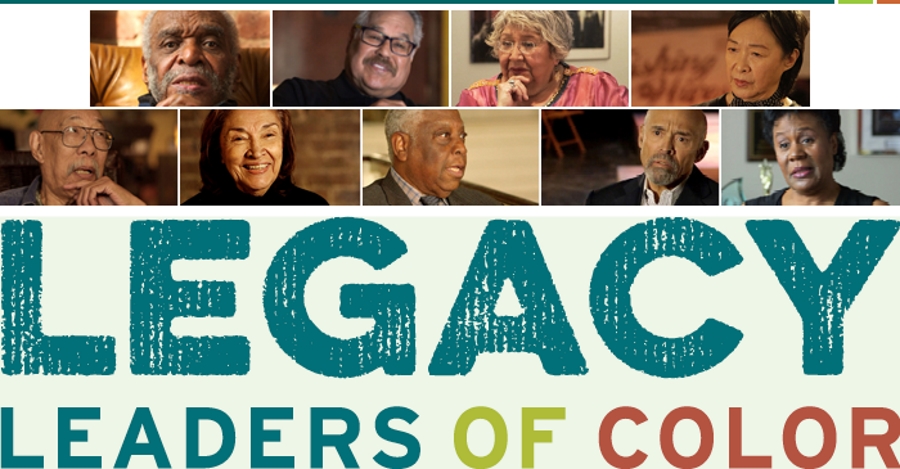“Our plays gave voice to those who were, if not voiceless, seldom heard in America.” —Tisa Chang, founder, Pan Asian Repertory Theatre
“This is about a spiritual movement that must happen.” —Jackie Taylor, founder, Black Ensemble Theater
“I’m doing theatre on the picket line. I asked myself, is it worth dying for? And I decided yes. I have no choice.” —Luis Valdez, founder, El Teatro Campesin
“Theatre was the first medium that impressed me to move. To do something.” —Woodie King Jr., founder, New Federal Theatre
“The world said, ‘No, you can’t,’ and we said, ‘Oh yes we can.’” —Muriel Miguel, founder, Spiderwoman Theater
“Theatre is my citizenship. It is my way to change the world.”—Lou Bellamy, founder, Penumbra Theatre
In 2012, as TCG began developing its Equity, Diversity & Inclusion action plan, Benny Sato Ambush urged us to find ways of illuminating and preserving the stories of veteran leaders of color, whose bravery and artistic impact have helped to define the broader American theatre movement. Embracing this charge would become a cornerstone of our six-point EDI initiative, helping to “establish a baseline” of historical information and thought leadership to undergird the EDI work ahead.
Conscious of the magnitude and possible long-term scope of such a project, we opted to begin with the stories of a small group of leaders who founded companies early in our resident theatre movement. With funding secured from the Doris Duke Charitable Foundation’s Fund for National Projects, along with the uncompromising will of then-TCG staffers Dafina McMillan and Ty Defoe (and current staffers Emilya Cachapero, Elena Chang, and Gus Schulenburg, among others), we completed an initial phase between 2014 and 2016, working with our partner MOPED, the same video production company with whom we collaborated on the “I Am Theatre” video series in 2011.
We are thrilled this year to be unveiling the first nine videos, which, in addition to the leaders quoted above, tell the stories of Douglas Turner Ward, Miriam Colón, and Frank Chin. The Legacy Leaders of Color Video Project (LLCVP) seems like a great way to say, at last: Welcome 2017!
What’s potent about these mini-documentaries is the way they underscore the personal activism that drove these leaders and their visions. Their theatres were founded not simply out of the need for personal self-expression, but also out of the urgent necessity to give voice to artists of all backgrounds and to activate theatre as a central place of ideas and organizing. I am humbled whenever I hear Luis Valdez’s words, “I asked myself, is it worth dying for? And I decided yes.” If not for their ingenuity and their bravery, these cultural organizations, their canons of work, and the artists they nurtured would not exist today.
There are many other practitioners of that generation—and those who have emerged since—who deserve to be honored through the Legacy Leaders of Color Video Project, and we will continue working to expand the program’s reach. For instance, at the 2016 National Conference in Washington, we captured stories ranging from John O’Neal, whose Free Southern Theater (1963) was the cultural wing of the Civil Rights movement, to Torange Yeghiazarian’s Golden Thread Productions (1996), the first American theatre company focused on the Middle East. Their videos are part of our Ground at 20 Project, honoring the 20th anniversary of August Wilson’s seminal speech, “The Ground on Which I Stand,” in which Wilson made an impassioned indictment of the field for not cultivating more theatres of color to grow into larger, more fully resourced institutions.
The LLCVP series and its rollout are also emblematic of the devotion we at TCG feel toward the legacy of all theatre leaders who paved the way for present-day practitioners. Lately I’ve been thinking (and writing) about the multigenerational nature of our movement, and how important it is for all generations to interact: to share knowledge and appreciation for each other’s contributions, and to understand the complex nature of being in a field of endeavor where artistry, business savvy, and a vital sense of purpose must find ways to coexist without canceling each other out. It was a herculean effort for all of our field’s founders, and the effort continues today—even if some (not all) of the problems look different in 2017 than they did in the mid-20th century.
As we move forward with a nationwide rollout of LLCVP, we welcome your involvement! There is much to be learned and shared. We are asking people to get on board as part of our Legacy Forward team, to host screenings, to present videos in your classrooms, to share them on websites and through email, and to support local theatres of color in your communities.
The beginning of our resident theatre movement roughly coincided with the complex times that gave us the Civil Rights movement, and that convergence made it both urgent and affirming for practitioners of color to actively claim space in the growing theatrical landscape. In 2017, as we look at what’s to come, let’s take strength from these visionaries who came before us and paved the way. And let’s be thankful that they are still working with us in our field today.


